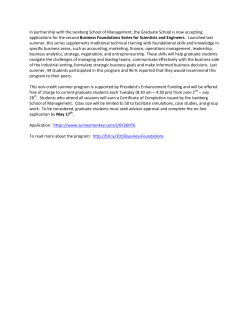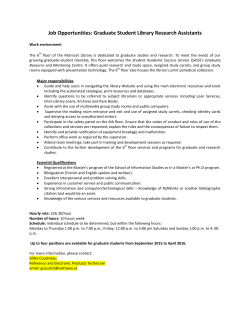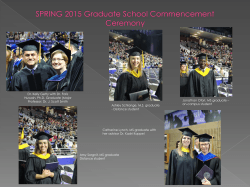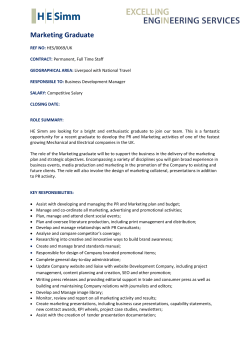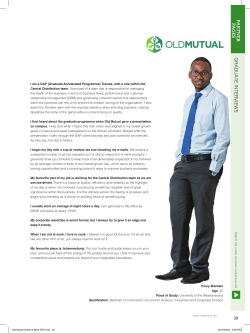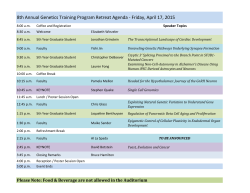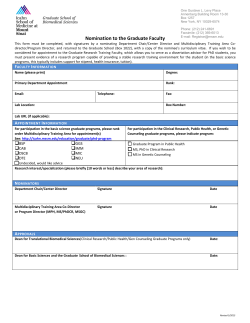
Northeast Conference Program 2015
2015 Northeast Regional Conference University of Pittsburgh April 10 – April 12 Pittsburgh, PA NATIONAL ASSOCIATION OF GRADUATE-PROFESSIONAL STUDENTS Northeast Conference Welcome Dear graduate-professional student leader, The 2015 NAGPS Board of Directors would like to welcome you to this year’s Northeast regional conference at the University of Pittsburgh. Our regional conferences are truly exciting events, inspiring ideas and energy throughout each region. Scout Johnson and her team have done a fantastic job organizing the conference this year, and we hope you’ll enjoy the event! We’d also like to take a moment to highlight a few of our events on the horizon. In addition to making this year’s regional conference series as successful as possible, we’re also gearing up to host our Leadership Summit at the University at Albany August 3-5. Graduate Professional Student Appreciation Week is scheduled for April 6th - 10th and we’re asking our members to hold events on their respective campuses that highlight some aspect of graduate-professional student life. The highlight of the week will be our GradsHaveDebt2 National Call Congress Day In service, NAGPS Board of Directors on Wednesday April 8th. We’re asking all members to participate in this event. We also hope you will be in attendance at our 29th Annual National Conference to be hosted by the Graduate Student Government at the University of Southern California (USC) in beautiful Los Angeles, California. Dates for the conference will be announced soon so stay tuned. Our goal is for this to be the largest National Conference we’ve ever held, and we will need your help to make this happen! Start thinking early about abstracts you wish to submit, and begin requesting funding from your University. As always, we always welcome your feedback on how we’re doing. In addition, if you are interested in volunteering for a committee, or in some other regard, please feel free to reach out to any of us for more details! Again, welcome to the Northeast Regional Conference! Northeast Conference Welcome THEMES, PROGRAMMING, AND TAKEAWAYS Dear friends and colleagues, Welcome to the University of Pittsburgh, our host for the 2015 NAGPS Northeast Regional Conference! As you know, this is a priceless opportunity for all of us to get together and exchange information and best practices, while building and strengthening our networks. This is a working conference, and our success is dependent upon all of us making our own contributions, whether in sharing best practices, past pitfalls, or brilliant new ideas spurred by ongoing conversations of those dedicated to service. Graduate and professional students are the nation’s future intellectual, business, and political leaders. Yet we face an increasingly uncertain future: increased competition over smaller pools of money for research and development, increased student loan debt, and increased political gridlock leaving Washington unable to address the critical problems of our time. Organizations such as NAGPS serve an increasingly important role in helping us as graduate and professional students learn the skills necessary to become effective national leaders, with advocacy training at the federal level - but also by helping us become more effective leaders in student government at our home institutions. This mission is a major reason that I volunteer my time and service to the organization. As part of this mission, the theme of this year’s regional conference is sustainability. Given an uncertain future, it becomes more and more important to develop student organizations that are sustainable - able to adapt to a changing environment, while improving school culture, being an effective political advocate, and making strategic financial choices. As the Northeast Regional Chair for NAGPS, my primary responsibilities are recruitment and retention of members within the region and assisting in the organization of the regional conference. I am fortunate and thankful to be working with many individuals who made planning this conference easier. In particular, I would like to extend a special thank you to David Gau, as well as the Graduate and Professional Student Government at the University of Pittsburgh, who were instrumental in organizing and executing conference logistics. I would also like to thank my Regional Board, as well as my fellow Regional Chairs, for their support and assistance, as well as Carolyn Commer, for invaluable feedback throughout the entire planning process. I look forward to meeting more of you this weekend, and hope you enjoy the conference! Sincerely, Will Frankenstein Northeast Regional Chair Cell: (412) 589-9788 3 FINDING YOUR WAY AROUND NAVIGATING THE CAMPUS 4 AGENDA PROGRAMMING AND NETWORKING Friday, April 10 4:00 PM Registration Lobby of Wyndham Hotel 100 Lytton Ave Pittsburgh, PA 15213 5:00 PM Campus Tour Depart from Wyndham Lobby 6:00 PM Dinner at Fuel & Fuddle 10 minute walk from hotel 212 Oakland Ave Pittsburgh, PA 15213 Saturday, April 11 Conference location: Mezzanine level Wyndham Pittsburgh University Center 100 Lytton Ave Pittsburgh, PA 15213 Conference Contact: Will Frankenstein (412) 589 - 9788 nerc@nagps.org 8:00 AM Breakfast 9:00 AM Opening Session - Welcome Room A Will Frankenstein, NAGPS Northeast Regional Chair Kristofferson Culmer, NAGPS President & CEO 9:45 AM President’s Roundtable Room A 10:30 AM Break 10:45 AM Roundtable: Developing a Graduate Community Room A David Gau, University of Pittsburgh Roundtable: Higher Education Hiring: Contingent and Adjunct Faculty Room B Caitlin Janiszewski, NAGPS Employment Concerns Chair 5 AGENDA PROGRAMMING AND NETWORKING 11:30 AM Graduate Students and Civic Engagement: Changing Discourse & Perceptions of Graduate Education Room A Will Frankenstein, Carnegie Mellon University Supporting International Students Room B Ankita Sharma, NAGPS International Student Concerns Chair 12:00 PM Lunch 1:00 PM Roundtable: Social Change, Justice, and Graduate Students Room A Sam Leitermann, NAGPS Social Justice Chair Hirah Mir, University at Albany Roundtable: Grant Program Allocation Model Best Practices Room B Kimberly Berg, SUNY Albany 1:45 PM Wheeling & Dealing: CMU’s Biking Committee & the Challenge of University-wide Sustainability Room A Mary Glavan, Carnegie Mellon University Strategic Plans: Sustainable University Practice or Subversive Advocacy Tool? Room B Carolyn Commer, Carnegie Mellon University 2:15 PM Making Social Events more Social: Trivia Nights as Grad Student Mixers Room A Carolyn Norwood, Carnegie Mellon University Using Graduate Student Clubs to Promote GSO Strategic Values Room B Travis Kruse, SUNY Stony Brook 2:45 PM Break 3:00 PM Pittsburgh Student Government Council: A Regional Student Government Council Model Room A David Gau, University of Pittsburgh Data-Driven Advocacy Room B Michael Shah & Jeremy Wachter, Tufts University 3:30 PM Northeast Region Business Meeting Room A 4:15 PM 6 Adjourn AGENDA PROGRAMMING AND NETWORKING 5:30 PM Evening Reception Mezzanine Level 6:00 PM Dinner 8:00 PM After Dinner Drinks The Porch 221 Schenley Drive Pittsburgh, PA 15213 Sunday, April 12 9:30 AM Northeast Regional Board Meeting Room A 12:00 PM Departures 7 SESSION ABSTRACTS Roundtables President’s Roundtable 9:45 AM Moderator: Kristofferson Culmer, President and CEO of NAGPS Participants are asked to speak candidly about their experiences and insights into leadership. Topics of discussion include managing an effective board, leadership struggles, and leadership development. Developing a Graduate Community 10:45 AM Moderator: David Gau, University of Pittsburgh Pitt GPSG has spent the past 3 years re-branding and building the foundation for a stronger graduate community. In this round table discussion, we would like to share our experiences on what worked or did not work. Topics include: student organization support, creating new student-run services, communicating across different units, and developing a collaborative environment. Higher Education Hiring: Contingent and Adjunct Faculty 10:45 AM Moderator: Caitlin Janiszewski, Employment Concerns Chair, NAGPS This session is intended to be a round table discussion about the issue of contingent/adjunct faculty. More and more attention is being drawn to this issue across the nation as higher education funding falls, tuition and student debt rise, and the the proportion of low paid adjuncts is increasing to close budget gaps. This pattern is part of a dramatic shift in the landscape of higher education and proposed solutions to the problems are wide ranging. This round table is intended to untangle some of the arguments made for and against contingent faculty, and unpack the discourse and political rhetoric which clouds the issue. This session also hopes to seek feedback from students across various institutions so that the Employment Concerns Chair can help develop a position for the NAGPS on this matter. Social Change, Justice, and Graduate Students 1:00 PM Moderators: Sam Leitermann, Social Justice Concerns Chair, NAGPS & Hirah Mir, University at Albany Syracuse University has had dramatic social change across campus in the past year. Several social movements have arisen in response to administrative decisions and incidents on campus. At Albany, This roundtable will discuss the response of student government to these issues, the role of student government in social justice advocacy, and the benefits of engaging with issues related to social justice. We will also discuss challenges and opportunities for advocacy and outreach that may exist on you own campuses. Grant Program Allocation Model Best Practices 1:00 PM Moderator: Kimberly Berg, University at Albany The purpose of this round-table discussion is to determine allocation model best practices for graduate student organization grants programs. In recent years, the University at Albany Graduate Student Association has sought to restructure the Grants Program in a way that will effectively benefit the graduate student body, in light of increasingly limited yearly operating budgets. That is, the discussants seek to facilitate a meaningful dialogue between graduate student organization representatives from a variety of different public and private, as well as large and small universities, who have successfully developed and implemented grant (professional development, research, etc.) funding programs for graduate students, in order to delineate possible allocation strategies for similar programs. 8 SESSION ABSTRACTS Cultural Sustainability Graduate Students and Civic Engagement: Changing Discourse & Perceptions of Graduate Education 11:30 AM Will Frankenstein, Northeast Regional Chair, NAGPS Graduate students choose to pursue their degrees for professional reasons: a degree can open doors and networks post-graduation. But professional development doesn’t just take place inside the university; it takes place in the public sphere, beyond classrooms and laboratories. A major component of work in the public sphere is advocacy. However, the current graduate experience is heavily biased against developing this aspect of a modern citizen. This talk will talk about different frameworks for service to help reframe the ongoing discussion about the future of graduate education. Making Social Events More Social: Trivia Nights as Grad Student Mixers 2:15 PM Carolyn Norwood, Carnegie Mellon University In this presentation I’ll discuss how Carnegie Mellon’s GSA has, in response to feedback from the graduate student body, attempted to create events that facilitate cross-disciplinary socializing and engagement. I’ll share our strategy for piloting a new on campus trivia night event this spring, including: Registration pre-survey to assemble diverse teams Questions geared to diverse grad populations Game format to spur conversations and collaboration The presentation will conclude with lessons learned from our pilot and tips for creating your own mixer event! Environmental Sustainability Wheeling and Dealing: CMU’s Biking Committee and the Challenge of University-wide Sustainability 1:45 PM Mary Glavan, Carnegie Mellon University This presentation will focus on how to effectively mobilize a small group of people who are motivated to act on a shared problem. I will use as a case study Carnegie Mellon’s Biking Advisory Committee (BAC), a group of graduate students, undergrads, faculty, and staff who came together with the goal of making bike issues more visible on Carnegie Mellon’s campus. “In this presentation, I will explore some of the pit-falls and best practices that we have experienced in making the committee sustainable in the long-term: • How to harness the energy of a new committee in order to get real work done • How to interface with multiple university stakeholders to generate funding and support • How to organize group resources and circulate information successfully This presentation will conclude with a group discussion, where I invite you to share your own successful and not-so-successful experiences in attempting to mobilize a small group of people to effect change on your own campuses. Pittsburgh Student Government Council: A Regional Student Government Council Model 3:00 PM David Gau, University of Pittsburgh The Pittsburgh Student Government Council (PSGC) is the first of its kind as a regional student government association. PSGC acts as a platform by which elected student leaders from all Pittsburgh institutions may unite to discuss relative issues and proper action in order to uphold the rights, vitality, and well-being of the common student. PSGC serves as a channel through which students may collaborate on events and merge common efforts to effectively engage students and contribute to the posterity of the City of Pittsburgh and the Allegheny County. In this session, we will share how such an organization was founded and what we have done since. 9 SESSION ABSTRACTS Financial Sustainability Using Graduate Student Clubs to Promote Strategic Values of the GSO 2:15 PM Travis Kruse, Stony Brook University Engaging with graduate students on a campus is difficult because of their busy schedules and lives outside of graduate school. But one of the goals of a graduate student organization is to bring graduate students together to build a sense of community and togetherness. At Stony Brook, the GSO cannot plan and coordinate all the events which interest graduate students. Instead, we allocate funding to clubs on campus that promote our strategic values. Doing this allows the graduate students to become their own bosses and do what interests them instead of having to go to GSO events and brings a wider set of interests to the graduate student body. Political Sustainability Supporting International Students11:30 AM Ankita Sharma, International Students Concern Chair, NAGPS Carnegie Mellon University has over 6500 graduate students, out of which 60% are international students; we represent all fifty states and over sixty-five nations. International students encounter immense difficulty transitioning from their local life to a new environment. The problems run the gamut from culture shock to understanding the curriculum and the academic system, legal documents and immigration requirements. There are two major offices on campus that help international students: the Office of International Education (OIE) and the International Cultural Center (ICC). However, are these offices able to fully support the diverse needs of an increasingly diverse student body? How can international students more effectively engage administrations and graduate student governments? This talk will discuss graduate student government best practices for supporting international students. Strategic Plans: Sustainable University Practice or Subversive Advocacy Tool? 1:45 PM Carolyn Commer, Carnegie Mellon University This presentation will focus on how to carry out a strategic planning initiative with your Graduate Student Organization (GSO). Over the last few years, there have been two approaches to strategic planning efforts presented at NAGPS conferences: (1) plans focused on improving the internal workings of GSOs and (2) plans focused on addressing broad issues impacting graduate students on campus. Using the strategic plan of Carnegie Mellon’s Graduate Student Assembly as an example, I will share lessons learned from our attempt to lead a strategic planning process incorporating both approaches. Three core challenges that the presentation will address include: (1) “Strategic plan” vs. “bill of rights”: defining the purpose & impact of your initiative (2) If you build it, they won’t necessarily come: the problem of grad student engagement (3) What your GSO can (reasonably) do vs. what your university should do: developing measurable goals & objectives In addition to providing lessons learned, I’ll also share tips on how to design a report that invites discussion and represents your organization’s values. Sample documents, discussion questions, and survey questions that we used will also be shared. Come learn from our mistakes! Data-Driven Advocacy3:00 PM Michael Shah & Jeremy Wachter, Tufts University As a graduate student council, our primary purpose is to advocate for graduate students and improve their overall graduate experience. Traditionally supporting graduate students has involved hosting social events, facilitating meetings with administration, offering workshops, making campus services known, setting up graduate student organizations, and providing funding to help students travel. However, the feedback loop if we are providing the right services has traditionally been a conversation at a general body meeting held monthly and occasional report forms. In order to gather additional data, we have begun surveying our graduate student population and are getting more feedback from a larger population of graduate students. This talk will highlight our graduate student council, how we launched a survey, and some of the data we have collected. 10 ELECTIONS & BIDDING PLANNING FOR THE FUTURE Interested in being more involved in NAGPS? Why not start with a regional board position? Elections will be held during the regional business meeting for the following positions: 1. Vice-Chair 2. Director of Outreach 3. Director of Legislative Affairs 4. Director of Communications & Administration 5. Employment Concerns Chair 6. Social Justice Chair 7. International Student Concerns Chair 8. Legal Concerns Chair If you are interested in more information about a position, talk to Will Frankenstein, Northeast Regional Chair. Each year a host school is selected to host the next regional conference. This occurs this weekend, also during our regional business meeting. NAGPS requests that potential Regional Conference Coordinating Councils (RCCCs) submit a letter of approval from their governing student body to the NAGPS Executive Committee and Regional Chair prior to the bid selection process. This letter shall provide approval of the organization to host the regional conference; this can include approval from your GPSO, Dean, or Administrator, and a named Director of Regional Conference to coordinate planning and volunteers of the regional conference (the Director must be a member of the host organization) Potential RCCCs shall present their proposal to the membership. Please limit your presentation to no more than 10 minutes and 10 slides. The presentation shall include, but is not limited to Dates of conference (must occur between March 1st and April 31st), location and member organization overview, meeting facilities, accommodations, projected budget, projected expenses for an attending organization, name of the Director of Regional Conference, required assistance from the Association. Time will be allotted for questions on each proposal. After all regional bid presentations have concluded, there may be a closed discussion followed by a vote of the membership. The majority vote of the regional membership will elect the Regional Conference Coordinating Council. RCCCs shall secure funding for the conference. It is the responsibility of the host school to lead fundraising efforts. All fundraising and other partners must be submitted to the Board of Directors, which reserves the right to reject any partnership. RCCCs shall adhere to the NAGPS Constitution, Bylaws, and Standard Operating Procedures. All approved written and verbal communications to host the conference are binding. 11 Northeast Regional Board FIND US AND SAY HELLO Will Frankenstein Chair, Carnegie Mellon University Will is a PhD candidate in Engineering and Public Policy studying computational models. His research focuses on nuclear proliferation and public perceptions of risk measured through social media platforms. He also serves at the 2014-15 Vice President for External Affairs at Carnegie Mellon’s Graduate Student Assembly (GSA). He previously served as a GSA representative for his department. He is a co-founder of Allies Grad, the LGBTQ group for all graduate students at Carnegie Mellon. He enjoys yingyeung, running, ironic Instagramming, and reminding people that after defending, he will indeed be Dr. Frankenstein. Travis Kruse Vice Chair, Stony Brook University Travis is a PhD candidate in Biomedical Engineering researching tissue engineering at Stony Brook University. Specifically he’s working on creating a prefabricated vascular network in gels to grow large scale tissues. He also serves on the Graduate Student Organization (GSO) Executive Committee at Stony Brook as the Secretary. He’s also Editor-in-Chief of the graduate student run magazine Frontier’s Magazine. As hobbies, he enjoys SCUBA diving, making useless things, and sleeping. Mary Glavan Director of Outreach, Carnegie Mellon University Mary, originally a Wisconsin farm-girl, is a 4th year Ph.D. candidate in Rhetoric in the English Department. She has a B.A. in English Literature from St. Cloud State University in Minnesota and a M.A. in Rhetoric from CMU. Her work focuses on disability advocacy work and public argument in special education law. Mary loves riding horses, baking cakes, and Ebay. Hanna Birkhead Director of Communication, University at Albany 12 Northeast Regional Board FIND US AND SAY HELLO Ryan Gregoire Director of Legislative Affairs, University at Albany Samema Sarowar Social Justice Concerns Chair, Stony Brook University Samema is a PhD candidate in structural biology studying pathogenic urinary tract infections at Stony Brook University. Specifically, she looks at the protein structures and how they are involved in the invasion mechanism. She serves on the Graduate Student Organization (GSO) at Stony Brook as her department’s senator. She is also an active member of the Women in Science and Engineering (WISE) at Stony Brook and the Brookhaven Women in Science (BWIS) at Brookhaven National Laboratory. She’s also the treasurer of the graduate student run magazine Frontier’s Magazine, which will be releasing its first issue in August. She is passionate about teaching and finds any way she can give back to the community. She volunteers at local and urban high schools in order to spread awareness about WISE and STEM. Hrushikesh Sagar International Student Concerns Chair, Rochester Institute of Technology Sudipta ‘Nila’ Devanath Legal Concerns Chair, Harvard University 13 Notes 14 Notes 15 WE ARE THE FUTURE. WHO WE ARE WHAT WE DO We are over 600,000 graduate and professional students standing together to ensure that our nation continues to produce top quality research, creative and artistic works, and invests in American education. We are the backbone of research and teaching at universities across the US, and play a key role in building our nation’s technological innovation and artistic and cultural heritage through scholarship and community engagement. We are America’s future business, political, and intellectual leaders. We are the future. NAGPS provides three core services to graduate-professional students in the US 80 + Universities across the US 600,000 + graduate-professional students STAND WITH US NAGPS.ORG ADVOCACY Coordinated federal and state advocacy on issues that impact students LEADERSHIP DEVELOPMENT Events, workshops, and publications that designed to empower the next generation of leaders in the US RESOURCES Access to benefits and services that help save students money and improve their quality of life NATIONAL ASSOCIATION OF GRADUATE-PROFESSIONAL STUDENTS
© Copyright 2025
